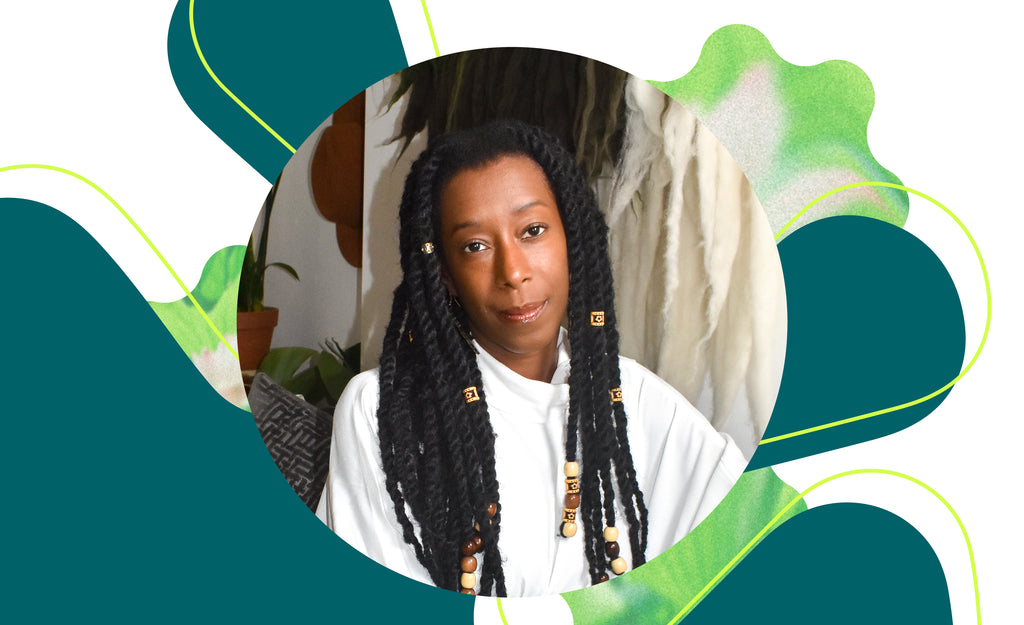Photo: Amanda Wallace
Solonje Burnett radiates weed auntie energy—a characteristic that she proudly identifies with. During our 45-minute Zoom call, where she sat on the floor of a dark hallway in New York’s Soho House (House rule #4: communal spaces are phone call-free), Burnett reminded me of that cool older sister who generously shares her wisdom and knowledge with anyone who will listen—except, that’s what she does for a living.
As the co-founder and CEO of Humble Bloom, a cannabis education and advocacy platform, Burnett has created a launch pad for women and BIPOC-owned cannabis brands. “For me, from day one, I’ve always been about amplifying the global majority—those people who don’t have advantages because of nepotism or racial or economic privilege,” she says. One way she does this is by speaking with Black thought leaders about cannabis, activism and well-being through Afropunk’s Radical Self-Care series and Soho House’s Reflection series. “That’s what I love to do: to use my platform for that purpose of pushing forward the people who are doing bad-ass shit.”
Cannabis—or “the plant” as Burnett calls it—holds special significance for people of color. From legislation to regulation, mass incarceration and environmental impact, weed is something that is highly politicized—and through her work at Humble Bloom, Burnett is hoping to break the stigma. “We’re really about curating culture and cannabis to connect people through the plant,” she says of Humble Bloom’s advocacy work and inclusive community experiences.
“We’re really about curating culture and cannabis to connect people through the plant.”
Because for Burnett, it’s personal. Cannabis has changed her life from the moment she was introduced to it in her junior year of college. She pulled her groin playing soccer and her roommate at the time gave her some marijuana-inflused balm and also encouraged her to smoke weed to help with the pain. Then, it became more integrated in her life when she met her post-college boyfriend, who was a regular cannabis user. “It didn’t become my own personal thing until my mid-20s when I finally was like ‘OK, I’m purchasing this plant and I’m rolling it up and I’m doing it on my own,” she says. “Cannabis has really helped with my creative process and being able to manage lots of things and not feel stressed out and filled with anxiety.”
During her time at company culture agency Live Grey, Burnett was introduced to Humble Bloom’s co-founder, Danniel Swatosh, through a mutual friend. “She and I started talking and exploring cannabis together. It was just this incredible time where my relationship was ending, and I was figuring out, ‘What do I do next?’ And as the saying goes, the rest is history.
The pair is continuing to “bring communities and people together, to educate them, to allow them to learn from the plant and from each other,” just as Burnett does every day. “I grew cannabis at home for the first time this year and it was one of the most transformative experiences to have to care for this plant for months and months. It’s being a plant mom on a whole other level, then to actually smoke it? Like holy shit! What a ritual. It was really magical,” she says.
When asked what an inclusive cannabis industry looks like, Burnett says: “It’s one that’s going to create pathways to abundance and prosperity for those of different identities. Right now, we’re seeing this great, white, male migration into cannabis because it’s just another industry in which people see an opportunity to capitalize and not because they have any connections with the plant. And they haven’t been affected by the criminalization of the plant. It has to be a full-spectrum approach that allows all types of businesses to take root and flourish throughout the supply chain—not one type that will be monopolized or taken over by corporate entities.”
And that’s what makes Burnett’s work with cannabis so radical—she’s building community, collectively healing and blazing a trail for other Black change-makers. And that’s something worth celebrating.
Who are you inspired by?
“I am inspired by a long history of Black femmes, but I will start with my mom. I know it’s so basic but it’s true. I love my mom. She came from the Caribbean and she has done so much to get us to where we are in this moment. I’m also inspired by women in politics like Cori Bush and Ayanna Pressley who are pushing for progress and for our basic humanity. And then, bell hooks, who recently passed. All of her work has been transformative for me for understanding love and communion and being a radical humanist.”
How do you unwind?
“Weed! I am all about weed, tea and watching something or reading something—that’s the end-of-day energy. Depending on whether I did it or not in the morning, maybe some kind of yoga and body movement.”
How many unread emails do you have right now?
“I have multiple email inboxes, so I’m going to choose the one with the least. One of them has 162. And they try to say weed makes you unproductive and lazy…”
What do you look for in an employee?
“Somebody that can broaden perspective but is similar in values.”
Best piece of advice you ever got?
“‘Keep being you.’ Being myself—fully, honestly, radically, transparently—has been an incredible thing because like, this is me, this is it. Take it or leave it.”
READ MORE
Open Letter: What It’s Like to Deal With Microaggressions at Work
Jaclyn Fu is Closing the Bra Gap for Small Chests
How Melody Lim Turned the Nostalgic Power of Scent Into a Thriving Business



